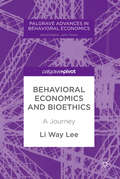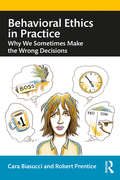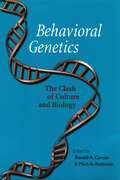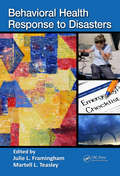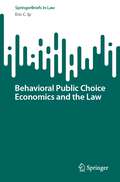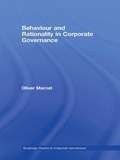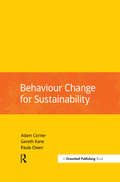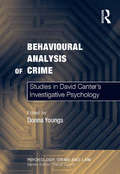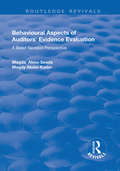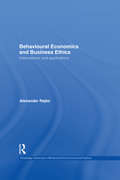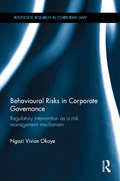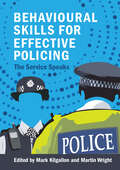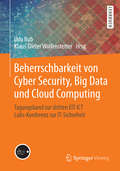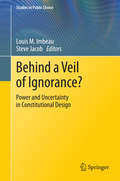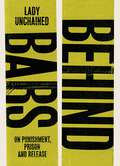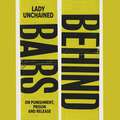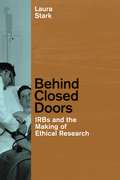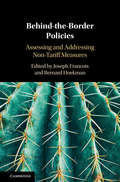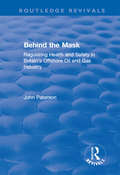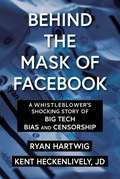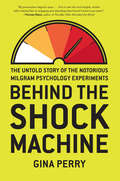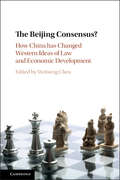- Table View
- List View
Behavioral Economics and Bioethics: A Journey (Palgrave Advances In Behavioral Economics Ser.)
by Li Way LeeThis book takes readers on a journey through the wide universe of bioethics, raising the following question: what is the proper attitude towards health, life, and death from the perspective of contemporary behavioral economics? Drawing on fields as diverse as economics, ethics, ecology, biology, and philosophy, this book seeks to uncover the bioethics we accomplish, not the moral principles that we advocate. This book covers life-and-death issues arranged around five themes: selves, persons, populations, species, and “Future Earth”. Ultimately, the author illustrates two kinds of justice: static and dynamic. Static justice prevails whenever parties are free to bargain with each other, while dynamic justice follows from parties' interactions over time. An examination into these types of justice reveals one particularly striking phenomenon: attempts by others to tip the balance of justice have a tendency to backfire. Of primary interest to behavioral economists, this book will also appeal to scholars studying bioethics, ecology, medicine, and philosophy, as well as all people dealing with issues of health, dying, and death.
Behavioral Ethics in Practice: Why We Sometimes Make the Wrong Decisions
by Cara Biasucci Robert PrenticeThis book is an accessible, research-based introduction to behavioral ethics. Often ethics education is incomplete because it ignores how and why people make moral decisions. But using exciting new research from fields such as behavioural psychology, cognitive science, and evolutionary biology, the study of behavioural ethics uncovers the common reasons why good people often screw up. Scientists have long studied the ways human beings make decisions, but only recently have researchers begun to focus specifically on ethical decision making. Unlike philosophy and religion, which aim to tell people how to think and act about various moral issues, behavioral ethics research reveals the factors that influence how people really make moral decisions. Most people get into ethical trouble for doing obviously wrong things. Aristotle cannot help, but learning about behavioral ethics can. By supplementing traditional approaches to teaching ethics with a clear, detailed, research-based introduction to behavioral ethics, beginners can quickly become familiar with the important elements of this new field. This book includes the bonus of being coordinated with Ethics Unwrapped – a free, online, educational resource featuring award-winning videos and teaching materials on a variety of behavioral ethics (and general ethics) topics. This book is a useful supplement for virtually every ethics course, and important in any course where incorporating practical ethics in an engaging manner is paramount. The content applies to every discipline –business ethics, journalism, medicine, legal ethics, and others – because its chief subject is the nature of moral decision making. The book is also highly relevant to practitioners across all sectors.
Behavioral Genetics: The Clash of Culture and Biology
by Ronald A. Carson and Mark A. RothsteinScientists conducting human genome research are identifying genetic disorders and traits at an accelerating rate. Genetic factors in human behavior appear particularly complex and slow to emerge, yet are raising their own set of difficult ethical, legal, and social issues. In Behavioral Genetics: The Clash of Culture and Biology, Ronald Carson and Mark Rothstein bring together well-known experts from the fields of genetics, ethics, neuroscience, psychiatry, sociology, and law to address the cultural, legal, and biological underpinnings of behavioral genetics. The authors discuss a broad range of topics, including the ethical questions arising from gene therapy and screening, molecular research in psychiatry, and the legal ramifications and social consequences of behavioral genetic information. Throughout, they focus on two basic concerns: the quality of the science behind behavioral genetic claims and the need to formulate an appropriate, ethically defensible response when the science turns out to be good.
Behavioral Genetics: The Clash of Culture and Biology
by Ronald A. Carson and Mark A. RothsteinNine essays examining the ethical, cultural, legal, and biological underpinnings of behavioral genetics.Scientists conducting human genome research are identifying genetic disorders and traits at an accelerating rate. Genetic factors in human behavior appear particularly complex and slow to emerge, yet are raising their own set of difficult ethical, legal, and social issues. In Behavioral Genetics: The Clash of Culture and Biology, Ronald Carson and Mark Rothstein bring together well-known experts from the fields of genetics, ethics, neuroscience, psychiatry, sociology, and law to address the cultural, legal, and biological underpinnings of behavioral genetics. The authors discuss a broad range of topics, including the ethical questions arising from gene therapy and screening, molecular research in psychiatry, and the legal ramifications and social consequences of behavioral genetic information. Throughout, they focus on two basic concerns: the quality of the science behind behavioral genetic claims and the need to formulate an appropriate, ethically defensible response when the science turns out to be good.“This book is well written and stimulating. The issues it raises are important for scientists and for those working in the legal and social-services fields, but they clearly also have relevance for everyone.” —The New England Journal of Medicine“This . . . is the best introduction to behavioral genetics that I have read. The varying viewpoints . . . are presented with such clarity that [this book] should appeal to the general public and serve as a basic text for college courses.” —Jay Katz, Elizabeth K. Dollard Professor Emeritus of Law, Medicine, and Psychiatry, Harvey L. Karp Professiorial Lecturer in Law and Psychoanalysis, Yale Law School
Behavioral Health Response to Disasters
by Julie L. Framingham, Martell L. TeasleyDisasters can cause long-term disruptions to the routines of individuals and communities, placing survivors at risk of developing serious mental health and substance abuse problems. Disaster behavioral health services provide emotional support, help normalize stress reactions, assess recovery options, and encourage healthy coping behaviors. They al
Behavioral Public Choice Economics and the Law (SpringerBriefs in Law)
by Eric C. IpThis book provides an accessible introduction to the emerging field of behavioral public choice economics and the law. This field studies how public officials, lawmakers, and judges fall prey to their own biases and heuristics, and how constitutions and judicial doctrines can be structured to mitigate these cognitive shortcomings. Written lucidly in plain language, this book is invaluable to all students, scholars, and general readers interested in behavioral economics, law and economics, and political economy.
Behaviour and Rationality in Corporate Governance (Routledge Studies In Corporate Governance Ser.)
by Oliver MarnetCorporate scandals due to bad accounting happen far too frequently for a system of corporate governance to be deemed effective. This book tells why the safeguards designed to prevent bad accounting so often fail. By studying why the auditors and members of a board of directors regularly fail to deliver the truth about a company‘s financ
Behaviour Change for Sustainability
by Adam Corner Gareth Kane Paula OwenBehaviour Change for Sustainability is a compilation of 3 bestselling sustainability guides that gathers together, in one place, a variety of effective tools and techniques for encouraging a lasting shift to sustainable behaviours in business and society. Promoting Sustainable Behaviour offers the definitive guide to building a sustainable behaviour campaign that works. By summarising "what really works" and pulling out the most important messages from the evidence base, this book contains all the tools you need to maximize the success of your sustainable behaviour initiative – in households, when commuting, in the workplace and beyond. Green Jujitsu outlines the smart way to embed sustainability within the culture of any organization, by working with employees' strengths and interests. Gareth Kane points out the hallmarks of unsuccessful approaches to cultural change, which are often confused, unimaginative or confrontational. He puts forward an alternative framework designed to play to people's strengths and interests and genuinely engage them in problem-solving. Gamification is fast emerging as a user engagement and behaviour change tool that succeeds where other tactics and strategies have failed. How Gamification Can Help Your Business Engage in Sustainability contains all the information businesses and other organizations need to make an informed decision about whether to adopt gamification as part of their own business and sustainability strategies – and the tools to get started.
Behavioural Analysis of Crime: Studies in David Canter's Investigative Psychology (Psychology, Crime and Law)
by Donna YoungsThe intense interest in 'offender profiling' generated by FBI special agents, gave rise to an explosion of studies in a new area called ’investigative psychology’ by its originator David Canter. This develops understanding of offenders' behaviour that can be harnessed to improve investigations. In this rapidly developing area much has been learnt about what offenders reveal about themselves through their styles of offending. Beyond criminals’ actions the location of their crimes can also reveal where the offender lives or which offences can be linked as part of the same series. Investigative psychologists also explore how to interview witnesses and suspects and assess the veracity of accounts given. The variation in criminal style across crimes as diverse as arson, burglary, hostage negotiation, serial killing and sexual assault is reviewed, using narrative theory and criminals’ emotional experience when offending as the basis for explaining these variations. This provides a framework for drawing inferences about offenders' characteristics. Studies in investigative psychology require a special methodology, developed by David Canter to allow scientific explorations in such a challenging field, previously assumed not to be open empirical study. The practical potential and applications of the research are given, as well as a selection of commentaries on the cutting edge debates that are driving the future of the investigative psychology. This new discipline is of relevance to forensic psychologists in many different settings, criminologists and law enforcement agencies, bringing together work that lays out current achievements and sets the agenda for future research in the field.
Behavioural Aspects of Auditors' Evidence Evaluation: A Belief Revision Perspective
by Magda Abou-Seada Magdy Abdel-KaderThis title was first published in 2003. Based on psychological research, auditing studies have focused on 'belief revision' as a way of understanding how auditors evaluate evidence. Moreover a belief revision process is consistent with US auditing standards. UK standards on the other hand do not appear to give guidance on the process to follow when evaluating evidence. Research in the US indicates that auditors do in fact follow a belief revision process in accordance with US standards. Employing survey research (based on personal interviews with a number of experienced UK auditors) this book demonstrates how auditors prefer to be described as following the open mind approach. Building on the findings of the interviews the book then describes an experimental study to investigate the differences between the belief revision and open mind approaches in terms of their effect on the efficiency and effectiveness of the audit process. The book concludes that the belief revision approach would improve the efficiency of the audit process without affecting its effectiveness or outcomes.
Behavioural Economics and Business Ethics: Interrelations and Applications (Routledge Advances In Behavioural Economics And Finance Ser. #1)
by Philip Alexander RajkoEconomics and moral philosophy have in recent years been considered to be distinct and separate fields. However, behavioural economics has started to reconcile various aspects of morality and economics, which has offered new conceptual opportunities to advance economics ethics and business ethics. This book aims to advance economic ethics and business ethics by combining normative principles and empirical evidence grounded on the key motivational forces in economic decision making. It has three core objectives: to assess order ethics as a theory of both economic ethics and business ethics, using behavioural economics methods and evidence; to identify cardinal virtues for modern business ethics; to to set up valuable guidelines for the implementation of economic ethics and business ethics.
Behavioural Risks in Corporate Governance: Regulatory Intervention as a Risk Management Mechanism (Routledge Research in Corporate Law)
by Ngozi Vivian OkoyeRecent cases of corporate failures, including the fixing of LIBOR rates and money laundering issues in the banking industry, highlight how behavioural issues on the part of company directors are significant contributory factors in corporate governance and the success or failure of companies. This book examines how personality and behavioural issues have contributed to major corporate failures, and how this risk may be managed. The book examines behavioural risks in corporate governance, and evaluates the extent to which risk management mechanisms have acknowledged various aspects of behaviour. Drawing from cases in the UK, the US and Australia and research in psychology and the behavioural sciences, Ngozi Vivian Okoye argues that current corporate governance mechanisms lack provision for identifying and managing personality risks, and suggests how constituent elements of behaviour should be engaged with when developing preventive mechanisms for corporate failures. Okoye presents a conceptual framework for identifying and managing personality risks, and explores how personality risk may be built into corporate governance regulation. The book will be of great use and interest to researchers and practitioners in business and company law, corporate governance, and critical management studies.
Behavioural Skills for Effective Policing: The Service Speaks
by Mark Kilgallon Martin WrightBehavioural skills are essential to effective policing practice and professional development, and are also embedded within the policing competency frameworks. As the police service looks to further redefine its role in the twenty-first century, this critical handbook covers the full range of these proficiencies, from building rapport, applying emotional intelligence, building empathy and resilience to diversity and difference, understanding ethics, and developing coaching and leadership skills.Each chapter is written by a distinguished serving or former senior police leader and/or policing scholar, bringing together a wealth of experience and understanding and applying this knowledge in context through key case studies and examples. Suitable for serving police officers at all levels, as well as policing lecturers and students aspiring to join the police, this book encourages and enables a people-centred approach to policing that balances the debate that has given disproportionate credence to transactional skills at the expense of a more transformational approach.
Beherrschbarkeit von Cyber Security, Big Data und Cloud Computing: Tagungsband zur dritten EIT ICT Labs-Konferenz zur IT-Sicherheit
by Klaus-Dieter Wolfenstetter Udo BubCloud Computing, Big Data, Cyber Security, Industrie 4. 0 etc. sind vielleicht nur Schlagworte, aber sie sind auch Ausdruck neuer, komplexer Problemstellungen, deren Behandlung und Beherrschung uns vor große Herausforderungen stellt. Deshalb sind wieder einmal, diesmal auf Einladung der EIT ICT Labs in Berlin, renommierte Sicherheitsexperten und Entscheidungsträger zusammen gekommen, um diese Themen zu diskutieren und beleuchten. Durch die Mitte 2013 bekannt gewordenen umfassenden Ausspähungen von Bürgern und Institutionen hat das Konferenzthema Beherrschbarkeit von Cloud und Co. weiter an Aktualität gewonnen.
Behind a Veil of Ignorance?: Power and Uncertainty in Constitutional Design (Studies in Public Choice #32)
by Louis M. Imbeau Steve JacobThis volume is a very interesting research project that includes the most careful work on constitutional power and limits to authority of which I am aware. In general, the contributors find that constitutional negotiations normally took place in settings where uncertainty was considerable. They also find that the more detailed the characterization of power relationships, the more liberal and durable the democracy tends to be. Roger D. Congleton This book addresses the issue of the impact of uncertainty in constitutional design. To what extent do constitution drafters and adopters make their decisions behind a veil of ignorance? More fundamentally, can we infer from constitutional texts the degree of uncertainty faced by constitution drafters and adopters? After an introduction (chapter 1), the book proceeds in two parts. The first part (chapters 2 to 4) introduces to the intellectual filiation of the project and to its theoretical and methodological foundations. The second part (chapters 5 to 13) presents nine case studies built on the same structure: historical account of the making of the Constitution, results of the content analysis of the constitutional text, and discussion of specific issues raised in the analysis. Chapter 14 concludes.
Behind Bars: Inside Ontario's Heritage Gaols
by Ron BrownTravel across Ontario and pay a visit to Ontario’s nearly 50 heritage jails. Built before the modern era of the OPP, they range in size from single cell lockups to massive monuments such as the Kingston Pen and the Don Jail. Although Spartan inside, many are architectural wonders on the outside and have been declared heritage buildings. A few have been converted to museums and show the harsh conditions that convicts had to endure. Behind Bars also tells of the many hilarious escapes, gruesome hangings and unusual trials which made Ontario’s old jails the centre of attention. Highlights include ghost-town jails in Silver Islet and Berens River; torture devices on display at the Penitentiary Museum in Kingston, along with the "shower" and the coffin-sized "box"; the man who was executed but didn’t die; mysterious escapes; the battle over Ontario’s smallest jail; Woodstock’s death mask; love stories gone wrong; Ontario’s first terrorist attack; the worst mass murderer; and haunted jails. "Noboby knows Ontario like Ron Brown." - CBC Radio
Behind Bars: On punishment, prison & release
by Lady UnchainedIn 2008, 21-year-old Lady Unchained got involved in a fight in a club while trying to protect her sister.Serving 11 months of her prison sentence, her life changed completely. Inside, Lady Unchained began to write, while battling isolation, loneliness and the fear of being wrongly deported. These notes became powerful bars of poetry, capturing first-hand the broken justice system and the racism rooted within it.Wide-awake poetry, Behind Bars traces how Lady Unchained's identity was irrevocably changed during her sentencing, time in prison and release.Behind Bars proves there is life after prison.
Behind Bars: On punishment, prison & release
by Lady Unchained***** 'So deeply gripping and inspiring...It will stay with me, always.' - Annie MacmanusIn 2008, 21-year-old Lady Unchained got involved in a fight in a club while trying to protect her sister.Serving 11 months of her prison sentence, her life changed completely. Inside, Lady Unchained began to write, while battling isolation, loneliness and the fear of being wrongly deported. These notes became powerful bars of poetry, capturing first-hand the broken justice system and the racism rooted within it.Wide-awake poetry, Behind Bars traces how Lady Unchained's identity was irrevocably changed during her sentencing, time in prison and release.Behind Bars proves there is life after prison.
Behind Bars: On punishment, prison & release
by Lady UnchainedIn 2008, 21-year-old Lady Unchained got involved in a fight in a club while trying to protect her sister.Serving 11 months of her prison sentence, her life changed completely. Inside, Lady Unchained began to write, while battling isolation, loneliness and the fear of being wrongly deported. These notes became powerful bars of poetry, capturing first-hand the broken justice system and the racism rooted within it.Wide-awake poetry, Behind Bars traces how Lady Unchained's identity was irrevocably changed during her sentencing, time in prison and release.Behind Bars proves there is life after prison.This audio edition of the book includes original music to accompany the poems. (p) 2022 Octopus Publishing Group
Behind Closed Doors: IRBs and the Making of Ethical Research
by Laura StarkAlthough the subject of federally mandated Institutional Review Boards (IRBs) has been extensively debated, we actually do not know much about what takes place when they convene. The story of how IRBs work today is a story about their past as well as their present, and Behind Closed Doors is the first book to meld firsthand observations of IRB meetings with the history of how rules for the treatment of human subjects were formalized in the United States in the decades after World War II. Drawing on extensive archival sources, Laura Stark reconstructs the daily lives of scientists, lawyers, administrators, and research subjects working--and "warring"--on the campus of the National Institutes of Health, where they first wrote the rules for the treatment of human subjects. Stark argues that the model of group deliberation that gradually crystallized during this period reflected contemporary legal and medical conceptions of what it meant to be human, what political rights human subjects deserved, and which stakeholders were best suited to decide. She then explains how the historical contingencies that shaped rules for the treatment of human subjects in the postwar era guide decision making today--within hospitals, universities, health departments, and other institutions in the United States and across the globe. Meticulously researched and gracefully argued, Behind Closed Doors will be essential reading for sociologists and historians of science and medicine, as well as policy makers and IRB administrators.
Behind-the-Border Policies: Assessing and Addressing Non-Tariff Measures
by Joseph Francois Bernard HoekmanOne feature of globalization is that barriers to international competition have come to be associated with differences in regulatory policies that increase the costs of engaging in cross-border sales. Such non-tariff measures (NTMs) have attracted growing attention from policy makers and raise important questions for policy research. This book provides a valuable overview of key issues related to NTMs and domestic regulation. It covers the classification and definition of NTMs, new sources of data on NTMs, the impacts of (different types of) NTMs, the challenges that confront efforts to reduce the negative trade effects of NTMs and what can and should be done through international cooperation to promote good practices in the design and implementation of NTMs. The contributors comprise a mix of leading trade policy experts - both academics and practitioners - and younger researchers who have specialized in the analysis of NTMs.
Behind the Mask: Regulating Health and Safety in Britain's Offshore Oil and Gas Industry (Routledge Revivals)
by John PatersonThis title was first published n 2000: The most recent developments in occupational health and safety regulation in the UK’s offshore oil industry represent a departure from traditional legal forms. But how should they best be understood and what advantages do they offer over the previous regulatory approaches? Informed by autopoiesis theory, this study takes seriously the notion of an empirical field constituted by diverse communicative systems and thus traces the development of the industry along a series of dimensions including those of management and engineering as well as of politics and regulation. Adapting cognitive mapping, the book offers graphic demonstrations of the resultant constructive misunderstandings of regulatory and scientific signals and accordingly an alternative perspective on the nature of risk. The latest regulatory developments are shown to possess the potential to address these issues but only insofar as they are understood as distinct from previous legal forms and in particular as an example of reflexive law.
Behind the Mask of Facebook: A Whistleblower's Shocking Story of Big Tech Bias and Censorship (Children’s Health Defense)
by Kent Heckenlively Ryan HartwigRyan Hartwig may be one of the most important figures in American history. Hired by Cognizant as a content moderator for Facebook, Ryan Hartwig began by keeping gruesome images of cartel violence in Mexico off the platform. This seemed like a righteous mission and yet, as time went by, it became clear the Facebook bosses saw an even bigger threat, Americans of a different political viewpoint. Ryan watched in horror as Facebook made a monumental shift after the 2016 elections, hiring thousands of US-based content moderators with one mission, to favor leftist viewpoints while suppressing the speech of conservatives. Ryan describes more than forty examples of such behavior, and it will radically rewrite your understanding of the past four years as you learn how the news regarding prominent individuals like Greta Thunberg, Alyssa Milano, and Don Lemon was censored to remove legitimate criticism of them. Viral videos of Trump supporters being attacked were removed from the platform, and moderators were told to look for signs of hate speech in Trumps' State of the Union addresses, while at the same time allowing vicious attacks against police, pro-lifers, and straight white males. As America's de-facto town square, Facebook was systematically suppressing free speech, which has traditionally been our country's greatest weapon to combat extremism from either side. Ryan knew he had to take action, and contacted Project Veritas, eventually filming many of these actions with a hidden camera for the world to see. We need to stand up against tech tyranny and corporations that attempt to control our conversations, our news, and our political narratives. Reading Behind the Mask of Facebook: A Whistleblower&’s Shocking Story of Big Tech Bias and Censorship is the first step to learning how to confront and defeat this tyranny.
Behind the Shock Machine
by Gina PerryWhen social psychologist Stanley Milgram invited volunteers to take part in an experiment at Yale in the summer of 1961, none of the participants could have foreseen the worldwide sensation that the published results would cause. Milgram reported that fully 65 percent of the volunteers had repeatedly administered electric shocks of increasing strength to a man they believed to be in severe pain, even suffering a life-threatening heart condition, simply because an authority figure had told them to do so. Such behavior was linked to atrocities committed by ordinary people under the Nazi regime and immediately gripped the public imagination. The experiments remain a source of controversy and fascination more than fifty years later.In Behind the Shock Machine, psychologist and author Gina Perry unearths for the first time the full story of this controversial experiment and its startling repercussions. Interviewing the original participants--many of whom remain haunted to this day about what they did--and delving deep into Milgram's personal archive, she pieces together a more complex picture and much more troubling picture of these experiments than was originally presented by Milgram. Uncovering the details of the experiments leads her to question the validity of that 65 percent statistic and the claims that it revealed something essential about human nature. Fleshed out with dramatic transcripts of the tests themselves, the book puts a human face on the unwitting people who faced the moral test of the shock machine and offers a gripping, unforgettable tale of one man's ambition and an experiment that defined a generation.
The Beijing Consensus?
by Weitseng ChenIs there a distinctive Chinese model for law and economic development? In The Beijing Consensus scholars turn their collective attention to answer this basic but seemingly under-explored question as China rises higher in its global standing. Advancing debates on alternative development programs, with a particular focus on social and political contexts, this book demonstrates that essentially, no model exists. Engaging in comparative studies, the contributors create a new set of benchmarks to evaluate the conventional wisdom that the Beijing Consensus challenges and that of the Beijing Consensus itself. Has China demonstrated that the best model is in fact no model at all? Overall, this title equips the reader with an understanding of the conclusions derived from China's experience in its legal and economic development in recent decades.
